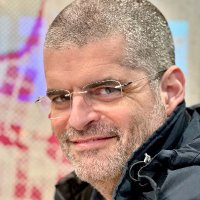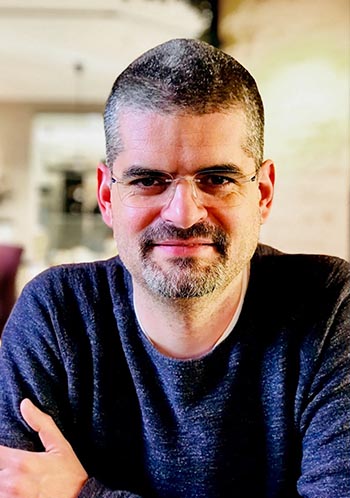|
home | what's new | other sites | contact | about |
||
|
Word Gems exploring self-realization, sacred personhood, and full humanity
Quantum Mechanics
return to "Quantum Mechanics" main-page
Dr. Bernardo Kastrup, PhD philosophy, PhD computer science, for many years worked at CERN, the large hadron collider in Geneva.
The following is reprinted from Beshara Magazine:
Mind over Matter Scientist and philosopher Bernardo Kastrup discusses his critique of materialism and argues that reality is essentially mental  Bernardo Kastrup has made a name for himself as an articulate and informed critic of the materialist paradigm. A scientist turned philosopher who started out working at CERN – the large hadron collider in Geneva – he argues that mind, not matter, is the underlying basis of world. He has written many books on the subject, including ‘Why Materialism is Baloney’ [1] and ‘The Idea of the World’ [2] (see our review), and is now director of the new Essentia Foundation [/], which links the idealist view to contemporary research in science and psychology. His latest book, ‘Brief Peeks Beyond’ [3] is due out on May 29th. He talks to Jane Clark and Richard Gault about the implications of these ideas not only for science but also for our understanding of ourselves as human beings.
Richard: Bernardo, your calling seems to be to help the world to understand that materialism is a flawed way of looking at reality. Bernardo: Yes, I believe that the philosophy of materialism is an in-your-face, incoherent theory of reality. And I’m completely ready to repeat that to anybody. Richard: Your background is unusual. You began your career working in the world of materialist science and then moved towards philosophy. You now have a PhD for work on the Philosophy of Mind, and have published many books related to this subject, including most recently on Schopenhauer [4] and Jung [5]. Bernardo: Actually, I have always been a philosopher by nature. I was always asking the big questions even as a child. I now realise that that is not typical, but when I was a child, it seemed natural to ask questions about the nature of life and reality and such like. But in my studies, I started by doing computer engineering, which I still love. It’s now my hobby and I design my own little computers on my workbench. My first job was at CERN in Switzerland, working on the large hadron collider, which was a childhood dream come true. I started there only two days after I defended my graduation thesis, and I was very happy there for several years. But at some point, when you are 33, 34, 35, you start going back to the deeper questions. In my case, that happened earlier because I was working with artificial intelligence. When you’re thinking about building an intelligent computer, the question that immediately arises is: will that computer be conscious? What’s the difference between intelligence and consciousness? It was at this point that I began to realise that trying to answer these questions within a materialist assumption is incoherent. More than that: it is impossible. It’s like trying to pull the territory out of the map. Richard: I understand that you had a sudden realisation about this when reading a paper by the philosopher David Chalmers in which he basically defined what is now called the ‘hard problem’ of consciousness.[6] Bernardo: Yes, Chalmers basically said that there is nothing about physical parameters – the mass, charge, momentum, position, frequency or amplitude of the particles and fields in our brain – from which we can deduce the qualities of subjective experience. They will never tell us what it feels like to have a bellyache, or to fall in love, or to taste a strawberry. The domain of subjective experience and the world described to us by science are fundamentally distinct, because the one is quantitative and the other is qualitative. It was when I read this that I realised that materialism is not only limited – it is incoherent. The ‘hard problem’ of consciousness is not the problem; it is the premise of materialism that is the problem. Then, as somebody with a strong analytic disposition, I immediately felt a gaping abyss in my understanding of the world. So I started looking for an alternative, correcting those previously unexamined assumptions – materialist assumptions – that I was making, replacing them with what I thought was a more reliable starting point and trying to rebuild my understanding of the world from there. I ended up as a metaphysical idealist – somebody who thinks that the whole of reality is mental in essence. It is not in your mind alone, not in my mind alone, but in an extended transpersonal form of mind which appears to us in the form that we call matter. Matter is a representation or appearance of what is, in and of itself, mental processes. 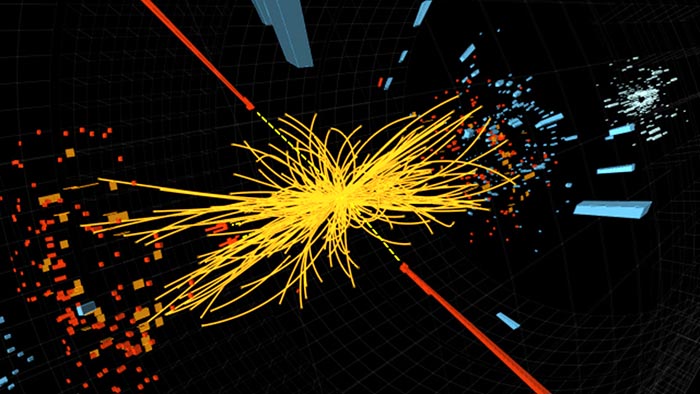 Proton-proton collision event in the Great Hadron Collider at CERN, in which two high energy electrons and two high energy muons (green lines and red towers) are observed, showing characteristics expected from the decay of a Higgs boson. Photograph: Thomas McCauley/Lucas Taylor, CMS, © 2011 CERN
The Message of Quantum Mechanics. Bernardo: Not as such. But if you are close to the foundations of physics – and at CERN we were dealing with the most fundamental part of the most fundamental science – you get used to thinking in abstractions, and to the idea that things are not fundamentally concrete. If you look deep enough into the heart of matter, all concreteness vanishes, and what is left is a pure mathematical abstraction that we call fields – quantum fields. And what is a quantum field? A quantum field is a mathematical tool which is postulated because the world behaves as if it exists. But that doesn’t mean that people at CERN have actually found a quantum field or touched one. This is true even of the so-called Higgs boson [/], which has got a lot of press in recent years. People think that we managed to capture one, or photograph one, or even measure one directly at CERN. But that’s not how it works. The Higgs, whatever it is, decays before it interacts with measurement equipment. What we measure is the debris that it turns into after it decays. We sort of theoretically reconstruct from that what should have been the Higgs, because we don’t have any other explanation for the debris we measure. So although I didn’t start thinking about idealist theories when I was at CERN, it did prepare me to part easily with the core intuition that matter has a concrete existence. Even as a materialist, I already knew that that was not the case. Richard: You talk quite a lot about quantum reality, however. And if I understand you correctly, you propose that reality consists of a number of different realms, one of which is the realm that we inhabit most of the time, made of what appears to be solid material. But this realm has arisen from a more fundamental realm which is described by quantum mechanics. Bernardo: Actually, I wouldn’t use the word realm. There is only one reality, and it is right here. But it has more sides than what we think it has. Let me give you an example. If you are sad – very sad inside, to the point of despair – and you look at yourself in the mirror, you may be crying. So you will see tears flowing down your face and contorted muscles, but not for a moment would you think that those tears and contorted muscles are the whole story. You know that behind those tears, there is the thing in itself – the real thing – which is your sadness. So the tears and the muscles are the extrinsic appearance, the representation of an inner reality. But that reality is not in another world. It’s right here. From a first-person point of view, it is the thing in itself – the sadness in itself – but it presents itself to observation as what we call ‘tears’. Jane: So the difference is the point of view from which we consider reality? Bernardo: Yes. I suspect that some of the world’s mystical traditions are referring to something like this when they talk about ‘the real world’ or ‘the afterlife’ or whatever. What we call the physical world – this planet, the moon, the sun, the galaxies, the black holes and quasars and galaxy clusters – are like the tears and the ‘real world’ is like the sadness when it is experienced from a first-person perspective. It is the difference between my looking at you while you’re crying, and my being you and knowing the sadness. These are experientially very distinct things, but they are not in different universes. Rather, they are differences in perspective which render the world completely differently. You could say that it is the difference between an internal perspective and an external perspective. Schopenhauer called it the difference between the representations and the will. Richard: How do you relate this to what we know about quantum mechanics, which seems to be a different layer from our ordinary physical reality? Bernardo: The key difference is between the thing in itself – the world as it is in itself – and the world as it presents itself to our observation. The world as it is in itself is pure: it’s a function of itself. But the world as it presents itself to our observation is not only a function of the world as it is in itself; it’s also a function of us and how we are put together to observe the world. In quantum mechanics we have the idea of the wave function – Schrödinger’s equation – which is an expression of all the states that are possible, and when we take a measurement, we say that it collapses – this is a bad term, I know, but it is ubiquitous, so I shall use it – into a particular state. But a measurement is already a representation – an appearance. It is what happens when the world as it is interacts with us. What we can measure is never going to be the world as it is in itself. So what quantum physics is telling us is that matter has no stand-alone reality. Matter is how the world appears to us when we measure it, when we interact with it, when we observe it – whatever word you prefer to use. As to what is behind that appearance, we cannot visualise it as anything material or physical because all the parameters used to exhaustively describe what we call material things are observables. The best we can know about the world as it is, is the quantum wave function, which is a statistical thing – a wave of possibilities. This is what we have to get through our heads. Quantum mechanics has been around since the early 20th century, but we have been stubbornly refusing to accept what it is showing us. If we abandon the need to preserve the intuition that matter has a stand-alone existence, then everything that we consider a great puzzle in quantum mechanics – the great paradoxes of non-locality and indeterminacy, etc. – immediately resolve. There is no great mystery here. The mystery is our stubbornness in trying to hold on to a failed intuition. 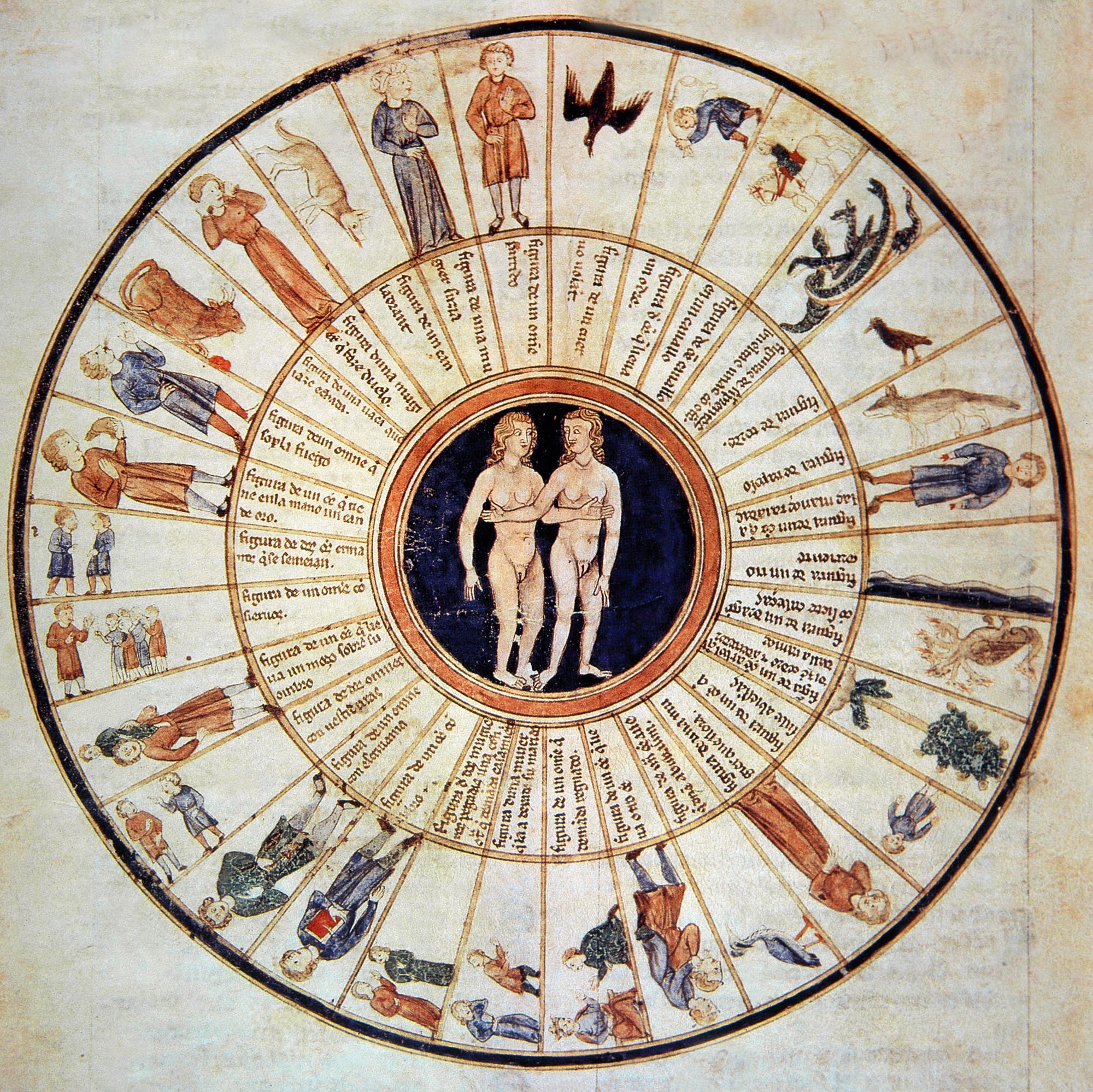 Run your mouse over the picture to zoom in on the details. The pre-Enlightenment cosmos; the zodiacal sign of Gemini with paranatellonta, surrounded by the constellations related to it. From Tratado de Astrologia y Magia by Alfonso X el Sabio, c. 1300. Vatican Library (Reg. lat. 1283, fol. 2v). Image: PRISMA ARCHIVO [/] / Alamy Stock Photo The World as Meaning. Bernardo: If we think of matter as having a stand-alone existence, then it has no meaning. The only meaning it has is what we see of it – it’s not pointing at anything else. Then the world becomes flat because there is nothing behind physicality. This is a very claustrophobic worldview – a nihilistic view – in which there is no meaning other than what we project upon the world ourselves. Whatever meaning we think there is in the world is a delusion. But if we absorb and internalise the notion that matter is only an appearance, then suddenly the entire physical world becomes like a book to be read because it’s an indication – a sign – of something behind it. This means that the dimension of mystery is recovered, and the meaning of life returns: however much suffering we experience in our life, it has meaning because we know that we are the eyes through which nature is looking and experiencing itself. We are making a contribution whether we know it or not, whether we are trying to do it or not. These are big things. Richard: You have said that this sense of meaning was lost in a very particular way in the Western world in the 17th century, in what we call ‘The Age of Enlightenment’. Bernardo: I actually think that the Enlightenment was a step forward in the history of humanity. But as with anything that humans can do, it has a positive and negative side. We collected handsome rewards, but we also pay an exquisitely high price for them, which is this nihilism. Jane: So what are these handsome rewards we have collected? Bernardo: Well, there are several. Materialism didn’t become mainstream without reason. One of its biggest advantages is that in one fell swoop it eliminated the biggest fear humanity has had throughout its history, which is: what are we going to experience after we die? In Christian terms, are we going to go to hell? This fear has dominated human life to the point that the Church could control whole continents and civilisations and became the most powerful institution in the Western world. It is this fear that makes us feel guilty, which imbues us with anxiety and a sense of responsibility for what we do. But if we don’t believe in anything beyond material existence, we don’t need to worry. And neither do we need to feel responsibility for the far future because we’re not going to be around anyway. So we can continue to plunder the planet and the climate for another hundred years without having to pay too large a price, because we don’t care what’s going to happen in the hundred years after that. We’re not going to be around. So it makes life light, as in Milan Kundera’s ‘The Unbearable Lightness of Being’.[7] But the price is depression, meaninglessness and isolation, which are the great plagues of modern civilisation. Jane: If people were to begin to adopt your point of view, would we have to come back to some idea of heaven and hell and the associated fear, or do you see a different, more benign interpretation emerging? Bernardo: I think nature is showing us every day that there is great delight and great suffering all the time. So I see no reason to favour either of the poles. They are part of nature. Do I think that one pole will be favoured over the other after we die? No. I could go into details why I think that, but right now I’m just going to say it. I think the process of death can be terrible because it involves ego dissolution. And anybody who has experienced a deep psychedelic trance knows how terrible this is – how horrible it feels to undergo ego dissolution for the first time.[8] If you’re undergoing it for the tenth time and you know what it is, it’s OK. It’s actually pleasant. But while you’re trying to stop it and defend your sense of personal identity, it can crush you, and the more you resist it, the more it will make you suffer. So I think the first phases of the transition can be terrible. After that, I think things are great, because it’s the end of our dissociation – by which I mean our separation as apparent individuals from the one universal consciousness. It’s the reintegration into the matrix of being where we were before we were born. And this reintegration, I think, is what most people call love. Love is the force that brings things together, as opposed to fear, which is the force that separates things. The experience of that reintegration, I think, will be equivalent to warmth, to being in the arms of a loved family member, a feeling of safety. But after that, after the euphoria of reintegration, I think all bets are off. I think it’s perfectly plausible that we could torture ourselves into suffering, just as we do here in this life. The fact that people can do this shows that consciousness has that potential – to torture itself. So I will not promise anyone that they won’t suffer. Jane: Do you think it’s possible to experience this sense of integration with the one consciousness during our lives, not just when we die? Bernardo: Yes of course. I think that by the mere fact that we are living beings, we are already rooted in that natural context. That’s where the roots of our beings lie, where we find a sense of belonging. So we all have that intuitive feeling by nature. The problem is that we run a cultural operating system in the intellect that informs us that those feelings cannot be true. If they cannot be true, they are not nurtured. They end up being repressed and we become dissociated from them. They are still there, but what the intellect doesn’t acknowledge is not considered plausible or possible, so the heart ends up not feeling those things. And when the whole culture around us is reinforcing that message, it becomes impossible to avoid the ultimate effect, which is our intellect filtering out that feeling of belonging that our natural self was born with and will always have, because that is our root. (For more on all this, see video right or below.) Richard: At one point in your writings, you adopt theological language for this one consciousness, and say that we live and die to render an indispensable service to God. What do you mean by this?
Bernardo: The point is we have a perspective on this consciousness that it doesn’t have on itself. So therein lies the whole value of the journey that we undertake. And when I talk about seeing, I mean not only what we physically see, but everything we experience – our despair, our tribulation, the love we feel, the anxiety we undergo. This is the landscape that consciousness experiences through us and that is our role. What idealism can encourage us to do is to drop the artificial filter. Then we are no longer talking about a conceptual conclusion. We are talking a lived reality. 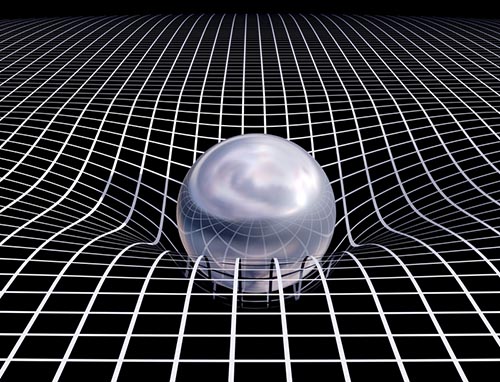 The space-time continuum, showing how solid objects like suns and planets cause it to bend. Image © Paul Fleet / Dreamstime.com Language, Space and Time. Bernardo: Language is always going to be a problem. One reason is that it embodies our cognitive modalities, which are not necessarily features of the world. For instance, space and time. Kant in the Western tradition was the first one to point out that space and time are not the objective scaffolding of the world but cognitive categories – our own way of taking things apart so we can comprehend them more easily. Schopenhauer resonated with that, as does today’s neuroscience and Einstein’s relativity. Time and space are not what we once thought they were. They’re not absolutes; they can be bent and twisted, and now with loop quantum gravity, physics is saying that they are not even fundamental. They are sort of by-products, arising out of quantum processes. So if you understand that space and time are not objective realities, but are highly subjective, you understand that they are just our own way of interacting with the world. But we build space and time into our language. So it’s flawed to think that language reflects the world as it is. In fact, we have to challenge the idea that the entire screen of our perception – all the things that we can see and hear – are a kind of transparent window into the world. This is an absurd notion, because if our screen of perception were indeed transparent, such that we mirror the state of the world inside ourselves, our inner states would suffer a lot of dispersion and we would literally dissolve into a soup because of the second law of thermodynamics, i.e. because of an increase in entropy. So our perceptions have to be encoded and inferential, therefore they cannot show the world as it is to us. Richard: If it is not a transparent window, what do you understand this screen of perception to be? Bernardo: I see it as a dashboard of dials on an instrument panel. We are like a pilot flying by instrument without a transparent windshield. Those instruments are very good. They are very accurate. They give us important information to survive, like a pilot who can fly by instruments safely and land safely if he takes those instruments seriously. But the world out there – the clouds, the lightning, the wind – are not the dashboard. So this notion that what we see is the world as it is in itself is what Professor Donald Hoffman calls ‘a rookie mistake’.[9] It’s very naïve. There has been a lot of research in this area now, but many defenders of the materialist position do not understand it. They think that the world of colours that they see is really out there. But there are no colours out there. There are no sounds out there. There are no flavours. According to materialism, colours, sounds, flavours are all generated by the brain inside our skull. So when they assert that what we can see and taste is all that exists, their position is self-contradictory. (For more on the nature of perception, see video right or below.) Their response to this kind of critique is that there is really a world out there, but it just doesn’t have any colours or any sense; it’s purely abstract. It’s a set of geometrical relationships that you can visualise as mathematical equations floating in empty space. But actually, even that goes too far, because it already entails qualities. So the ‘real world’ which materialism posits is actually a pure abstraction. How many regular people – educated people on the street who aren’t studying this subject – really understand that this is what materialism is? If they did, it would become much easier to reject it.
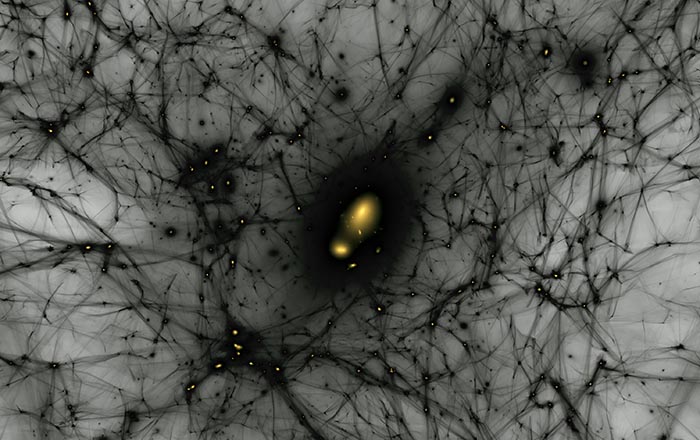 Dark Matter: a still image from a simulation of the formation of dark matter structures from the early universe to today. Gravity makes dark matter clump into dense halos, indicated by bright patches, where galaxies form. Image: Ralf Kaehler/Ethan Nadler/SLAC National Accelerator Laboratory; for more, click here [/] Materialism as Metaphysics. Bernardo: The problem is that the word ‘metaphysics’ has become associated with introspective ways of gathering knowledge – like prayer, meditation, mysticism. So in popular culture, the word metaphysics now means something spiritual. That’s not at all the origin of the word and it’s not the way I use it. Metaphysics simply means the study of what is, and it is not at all the same as physics. What science studies is how things behave, not what things are in and of themselves. The scientific method is to set up an experiment which asks nature: if I set up these circumstances, how are you going to behave? Then you run the experiment and the answer is a behaviour which you can check against your predictive mathematical models. Metaphysics is informed by science, because if you have a metaphysical theory that implies that nature should behave like A and science shows you that it behaves like B, then your metaphysical theory is flawed. So whatever metaphysical theory you produce has to be consistent with the behaviour of nature as predicted by proper and good science. The problem at the moment is that we have a metaphysics called materialism. But it has become so ingrained that people don’t think of it as a metaphysical theory anymore. They think of it as a fact. Materialism is not science; materialism is a statement about what things are, namely, that things are material and not mental. What is more, it is an extremely convoluted theory, and one of the worst we have ever had in all sorts of ways – in terms of explanatory power, in terms of parsimony, in terms of coherence, and even in terms of empirical adequacy. It fails to explain a lot of stuff; we have a cosmological theory, for instance, which on its own admission is only valid for 5 per cent of the content of the universe. The rest of it – so-called ‘dark matter’ and ‘dark energy’ [/] – is not understood at all. 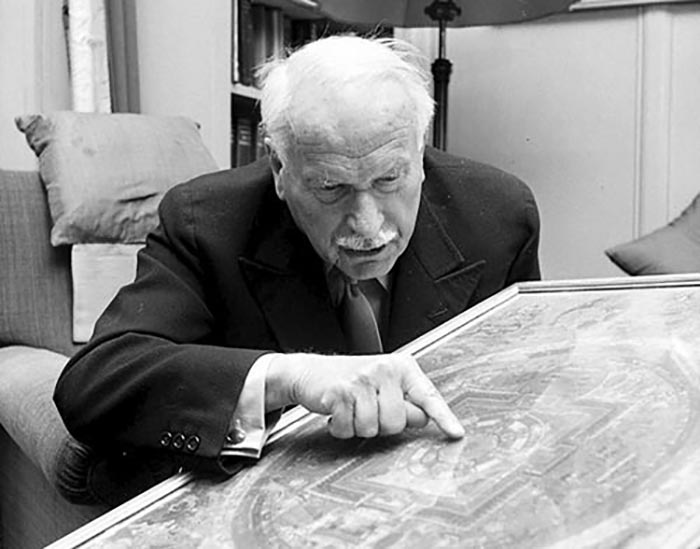 The great pioneer of psychotherapy, C.G. Jung, indicating the meaning of a Tibetan mandala. Photograph: yesofcorsa.com An Idealist World. Bernardo: Well, one thing is that the world would suddenly have meaning, as I said earlier. There are also many practical things. If we start to think of ourselves as essentially mental beings and see our body as an appearance of mental processes, we have to take mental health care seriously. We have to see mind as a potential and complementary avenue to solving organic problems. And that would add an entire avenue for health care improvement next to drugs and surgery. Now, don’t get me wrong, I take drugs and surgery very seriously. They have saved my life more than once. We should absolutely not neglect them. We should investigate them, and we are probably better investing in them than in the next supercollider. But it seems insane to me to be ignoring this other avenue that could offer solutions for things that today we have no cure for, like cancer. What is really going on with cancer? Parts of the body suddenly don’t obey the conductor, and a member of the orchestra starts playing separately. Doesn’t that sound like the extrinsic appearance of an internal dissociative process? Current researchers are uncomfortable if you ask them about these things and say that they don’t even know how to begin. This is because in our society we are very unsophisticated about psychology. Comparing it to the development of physical medicine, we are not even at the point of using mercury to treat syphilis, or leeches to suck blood out of people to cure a fever. We have hardly begun taking steps towards a proper, in-depth understanding of the mind. And this is a direct result of our metaphysical prejudices. If we think of the mind as some kind of by-product or epiphenomenon of matter – or even an illusion – of course we don’t expend the effort to find out about it in a sophisticated way, or to develop new languages which help us understand it. And because we don’t have a good understanding, we don’t even know how to begin thinking about psychosomatic phenomena. And that becomes a sort of a vicious circle which perpetuates the situation. All that would change if we adopted an idealist point of view. Jane: Do you not think that a lot of people in the Western world are already exploring this point of view? Enormous numbers are now engaged in some form of meditation, mindfulness, or introspective practice, and there is a lot of knowledge about traditions like Vedanta and Buddhism, which have developed very sophisticated theories of mind and consciousness over thousands of years. Also, people like Francisco Varela [/] and Matthieu Ricard [/] – not to mention the Dalai Lama – have been working to make bridges between Buddhist understandings and western science. Bernardo: I think these are very laudable steps which we should be taking. But I think generally there is still a lack of sophistication about our understanding, both about what meditation is and what, for instance, Buddhism is. People think that in Buddhism there is no self, but actually what is really meant is that there is no individual, stand-alone self. I think there is always a danger of attempting to match the sophisticated streams of Eastern spirituality with some form of materialism and therefore, of missing the big, big elephant in the room. This happens because people have a need to preserve the values we have become publicly committed to, which are based on assumptions of materialism. They want to help materialism survive the increase in our understanding in leading edge fields like quantum mechanics and neuroscience, so they find ever more tortuous, acrobatic ways to reconcile materialism with recent findings. And this includes how Eastern spirituality is engaged with. Richard: Finally, would you like to say something about your new role as an executive director of the Essentia Foundation [/]. Bernardo: Yes. Very briefly, I am now leading a new organisation whose objective is to promote the science and philosophy that motivate idealism. We are trying to bring the most important scholars together and produce free content – audio, visual, and written word. There is already a lot online, and new material coming every week. Jane: This sounds very interesting. We wish you well with this new project and thank you for speaking with us.
|
||
|
|
